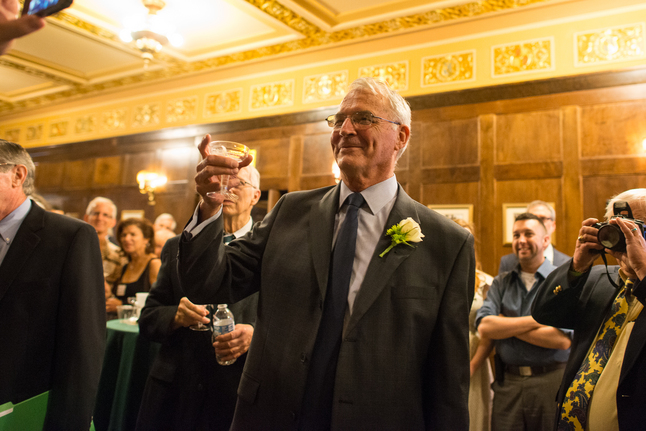
Eastern Michigan University Professor Henry Aldridge is honored at the Michigan Theater on Thursday.
Courtney Sacco | AnnArbor.com
Many know him as a film studies professor at EMU, the one who started the Electronic Media and Film Studies program. Also a well-published scholar of the history of film exhibition, Aldridge is retiring after over 4 decades of teaching.
Aldridge is also the man they credit for helping to save the Michigan Theater its Barton Organ from demolition in the late 1970s. A longtime theater volunteer, the antique pipe organ's curator, and an emeritus board member, Aldridge may know the theater better than almost anyone else in town.
"When I was in college at the University of North Carolina, I got interested in theater organs that accompanied silent movies," and he worked on one while he was there, he told AnnArbor.com over the phone Friday. "When I came to Ann Arbor to go to graduate school, and I found out about the one at the Michigan Theater."
He brought together a group of people who met at the Michigan Theater on Sunday mornings to restore the old pipe organ to playing condition. "Then in the fall of 1972, I decided we needed to play the organ in public. I came up with the idea to have the organ played before the movies started," he explains.
In 1978, they learned of plans to demolish the theater and put in a shopping court. "We couldn't let that happen," Aldridge says. So, he became the theater's advocate - calling people, getting former Ann Arbor mayor Lou Belcher (in attendance at the event) interested in the cause, and becoming an incorporating officer of the Michigan Theater Foundation.
Michigan Theater Executive Director Russ Collins credits Aldridge for the fact that the 1920's American movie palace is still around in 2013. "Henry was the one who waved the flag and said, this is an important thing in Ann Arbor, pay attention to it. He was the guy who stood up at City Council and said, this is a community asset and let's see if we can save it. Lou Belcher and certain members of City Council paid attention, and philanthropist Margaret Townsley became involved. His advocacy was crucial to the theater being saved from the wrecking ball in 1979," Collins told AnnArbor.com.
As he enters retirement, Aldridge will continue to be the Barton Organ's caretaker and remain involved as a Michigan Theater volunteer. He is also teaching film history courses at the theater as part of an educational outreach to the community.
Planned to be published this fall, Aldridge has written a book about the history of the Michigan Theater - a look at the American movie palace's long life. "It's not a coffee table book," he laughs, hoping people will find it to be "a thorough examination," he says.
Film studies programs have emerged in academia over the span of Aldridge's teaching career, but when he started there were not many courses on the subject. "Film studies as a discipline didn't appear until the 1960s. When I was an undergrad in North Carolina, there were no film classes, only radio production and speech. At U-M, as a graduate student, there were a few film classes in the speech department," he explains. But he was able to do his dissertation on film history.
Then in 1972, he was hired to teach at EMU and started courses in film appreciation and such. "By 1976, it was a full-fledged program that you could major in," he says.
Aldridge won't disappear from EMU right away. "I will probably do an adjunct course in the all. And I'm doing a course in Italy in June. I do two trips a year with students to Italy and New York, and we're keeping those. And whatever the area needs, I'll do within reason," he says.
A real fixture at EMU and the Michigan Theater, Aldridge has touched many people's lives. Colleagues and friends made glowing speeches at his Thursday evening celebration. After they gave their thanks to Aldridge, he remarked to his guests, "You never really realize who you are and what impact you have on people until they tell you, and I've learned a lot about myself tonight."